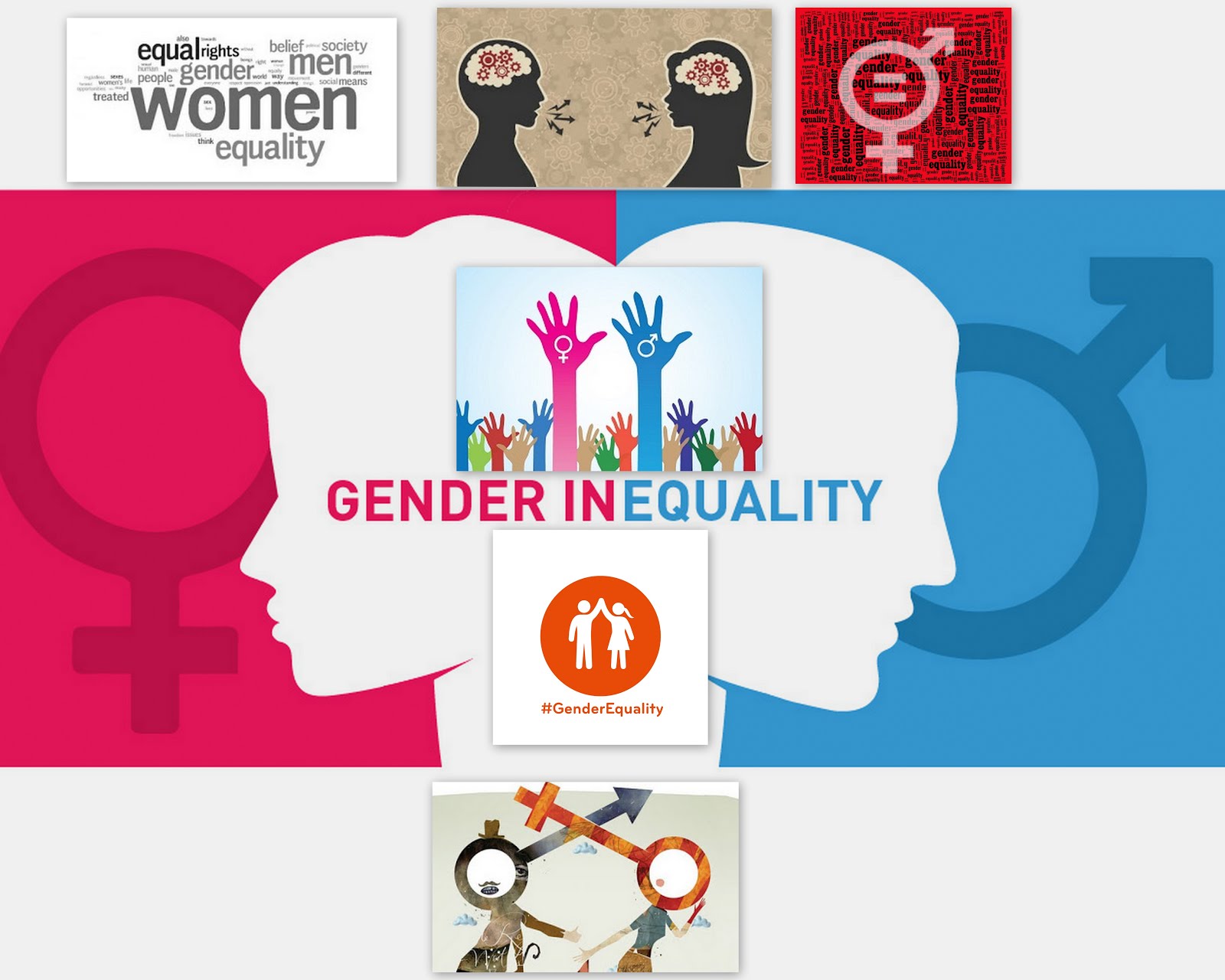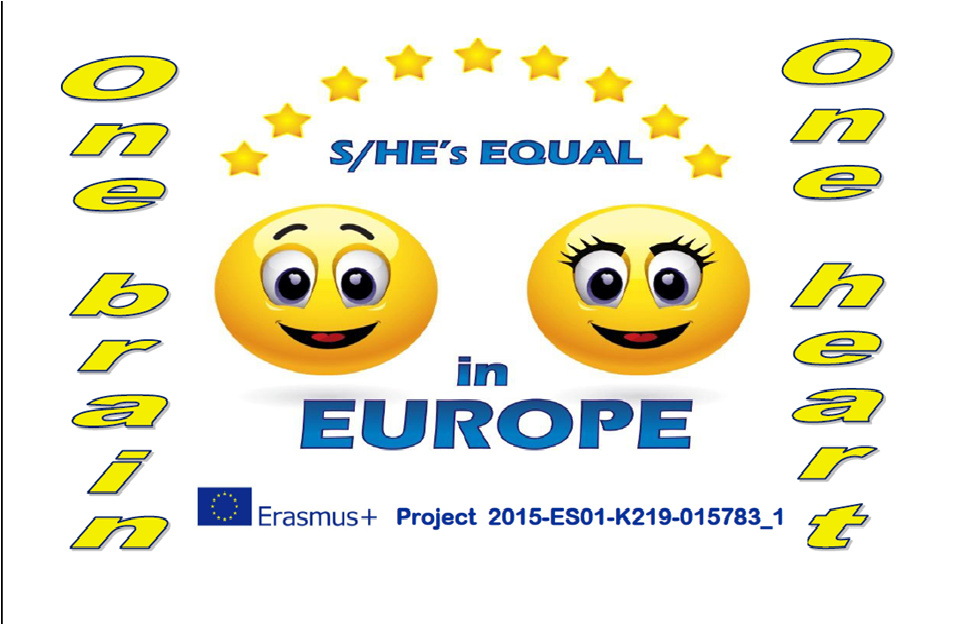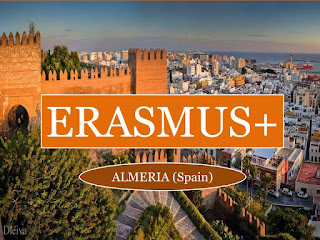https://drive.google.com/file/d/0B3a4OOFlG8TXYUM0bGJMM0xDa2M/view?usp=sharing
.

EQUALITY

Sunday 22 May 2016
Friday 20 May 2016
Thursday 19 May 2016
Meetings - Bulgaria
Bulgaria, 04.04. – 09.04 2016r.
On 4-9 April 2016 in Veliko Tarnovo in Bulgaria, there was another meeting of students and teachers of partner schools from Portugal, Romania, Bulgaria, Finland, Greece, Turkey, Spain and Poland, participating in ERASMUS + program. Our school in Lubzina was represented by four teachers: M. Stachura , S. Niedzielska - Plezia , E. Śliwa , B. Nowacka and four students:
D. Marć , M. Ciolkosz , J. Klocek from 5th grade and I. Marć from 1st grade of junior secondary school.
The journey started at 8.55 from the airport in Jasionka near Rzeszow. We arrived in Sofia approx at 2pm. We still had about 240 km by bus to Veliko Tarnowo. After checking in at the Hotel ‘Premier’ we had a dinner with the groups arriving the same day.
On Tuesday a coach took us to Stanlev school, where we were officially welcomed by the principle and coordinator of the project in Bulgaria. We also watched artistic program performed by the Bulgarian children and danced the traditional folk dance ‘Horo’ together with them.
Then there was a division into two groups. Teachers from partner schools went to a lecture in English entitled: " Women in male profession" , and the children at that time, under the guidance of teachers from Bulgaria, presented themselves in English, showed their countries on the map of Europe , learned songs about mother in Bulgarian, they gave each other gifts and Easter cards . After lunch, the teachers went to another lecture entitled: " Woman during the socialist times", and the students wrote the continuation of the ping - pong story, the beginning of which was made during a visit in Spain. As a reward for the great work done all the kids spent a nice time at the bowling alley.
On Wednesday was the continuation of classes. From morning teachers and coordinators from each of the partner countries to share their knowledge of the principles of equality in their country in various fields as in education, work and household duties. While the students went to the historical museum , where together with students from the university have to perform the assigned task: to find an object in the museum hall, answer questions and present in English the work they’ve done. After lunch, the teachers and students were divided into groups. Each group participated in the "Equality games" , which consisted of carefully exploring the old part of Veliko Tarnovo and observation of monuments and buildings of the old town, because later each group had to draw a map with objects, buildings they have seen and present it in English in front of all the participants. Through participation in this game we could explore Veliko Tarnovo, which is one of the oldest cities in Bulgaria and historically the third state capital. It is situated on several hills separated by a strongly meandering Yantra River here, of which the most important are Sveta Gora, Tsarevets and Trapezitsa. We paid particular attention to the location of the houses, which seemed like they stood one on the other. We learned that the location of the city forced the special, extremely narrow structure. When you returned, full of impressions, we went to the gala dinner, where the main attraction was the audiovisual show " Music and Light " viewed from the observation deck of the restaurant. After an extraordinary presentation there was a disco for children led by professional DJs .
The next day we got to know the history of Bulgaria. First we went to a small village Etyram, which in 1964 was transformed into a picturesque open-air museum "in the open" depicting the living conditions of the eighteenth and nineteenth century Bulgarian village. We saw dozens of different kinds of old houses, shops and craft workshops and working here bakers, saddlers, millers, potters, blacksmiths and weavers who produce on-site clay pots, textiles, fur coats, bread and folk instruments. Next on the agenda was a trip to the village Bożenci, in which the architectural museum depicting the living conditions of the Bulgarian village the National Revival period. After returning to the hotel, coordinators from all countries had an evaluation meeting, and the children presented their skills: karate, singing, playing the piano, folk dance "ERASMUS + Talent Show." Our Polish children presented a dance routine to the song "Chocolate" and then danced together with all the participants from the partner countries.
On Friday we went to the charming village of Arbanasi, located on a scenic plateau, where the present day survived five historic churches and nearly a hundred historic buildings. We saw among others, elevated at the turn of the sixteenth and seventeenth century church of the Nativity , hidden behind a stone wall of seventeenth century house Konstancaliewa and a church of the archangels Michael and Gabriel . In this village, we ate traditional Bulgarian meal of roast lamb, watched a performance of folklore and learned folk dance steps. On the way back we walked to the horse farm, where children could try horse riding. After returning we had time to finally use the hotel's swimming pool, which was awaited impatiently by our pupils.
During the stay the students had many opportunities to integrate with the participants from the partner schools. Social activities , sightseeing, accommodation in a hotel, meals and fun allowed grinding of English and overall social development of children. Students will remember this trip for a long time, because they are full of unforgettable experiences and made new friends with the participants of the project ERASMUS + .
Wednesday 18 May 2016
Tuesday 17 May 2016
Monday 16 May 2016
Tuesday 10 May 2016
Activities - Equality Compromise fotr students - Poland
Lubzina, 17.03.2016r.
„S/HE IS EQUAL IN EUROPE”
EQUALITY COMPROMISE FOR STUDENTS
This compromise is an activity of our Erasmus+ K2 Strategic School Partnership Project named “S/He Is Equal In Europe” and is an agreement prepared for pupils with the aim of reinforcing equality between man and woman at school and home-life, stopping every kind of discrimination, and supplying a respectable and equitable learning environment.
1. We respect each other.
2. We will not discriminate anyone in anyway.
3. We do not use bad language or sexual words anywhere.
4. We help our younger/older friends.
5. We help our younger/older siblings.
6. Boys help mums at house chores and girls help dads in their house chores.
7. Children will work from time to time in mixed pairs.
8. Boys and girls take care of the classroom equally.
9. We help teachers during lessons (don’t talk, don’t use bad language, obey the school/classroom rules).
10. We won’t take part in bulling acts.
it is signed by all students at school
Friday 6 May 2016
Wednesday 4 May 2016
Tuesday 3 May 2016
Videoconference Bulgaria-Finland
Part 1
Part 2
Subscribe to:
Posts (Atom)








